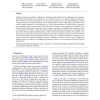Free Online Productivity Tools
i2Speak
i2Symbol
i2OCR
iTex2Img
iWeb2Print
iWeb2Shot
i2Type
iPdf2Split
iPdf2Merge
i2Bopomofo
i2Arabic
i2Style
i2Image
i2PDF
iLatex2Rtf
Sci2ools
118
click to vote
SCA
2007
2007
Hybrid simulation of deformable solids
Although mesh-based methods are efficient for simulating simple hyperelasticity, maintaining and adapting a mesh-based representation is less appealing in more complex scenarios, e.g. collision, plasticity and fracture. Thus, meshless or point-based methods have enjoyed recent popularity due to their added flexibility in dealing with these situations. Our approach begins with an initial mesh that is either conforming (as generated by one's favorite meshing algorithm) or non-conforming (e.g. a BCC background lattice). We then propose a framework for embedding arbitrary sample points into this initial mesh allowing for the straightforward handling of collisions, plasticity and fracture without the need for complex remeshing. A straightforward consequence of this new framework is the ability to naturally handle T-junctions alleviating the requirement for a manifold initial mesh. The arbitrarily added embedded points are endowed with full simulation capability allowing them to collid...
Related Content
| Added | 30 Sep 2010 |
| Updated | 30 Sep 2010 |
| Type | Conference |
| Year | 2007 |
| Where | SCA |
| Authors | Eftychios Sifakis, Tamar Shinar, Geoffrey Irving, Ronald Fedkiw |
Comments (0)

